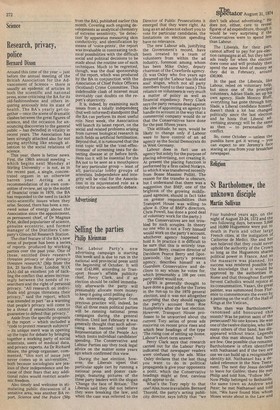Science
Research, privacy, police
Bernard Dixon
Around this time of the year — just before the annual meeting of the British Association for the Advancement of Science — there is usually an epidemic of articles in both the scientific and national press, some criticising the BA for its old-fashionedness and others inquiring anxiously into its state of health. The BA's yearly get-together — once the scene of dramatic clashes between the great figures of science, and the occasion for announcing discoveries to the general public — has dwindled in vitality in recent years. The Association has been strongly attacked also for not paying anything like enough attention to the social relations of science.
This year, there is better news. First, the 136th annual meeting — which begins next Monday at Stirling University — is not, as in the recent past, a single, concentrated orgasm in an otherwise barren year. Acting on a recommendation of its own committee of review, set up in the midst of financial crisis in 1970, the BA has responded to the need to tackle socio-scientific issues when they arise. Second, there has been a renewed sense of energy about the Association since the appointment, as permanent chief, of Dr Magnus Pyke, skilled populariser of science, genuine eccentric, and former manager of the Distillers Company's Glenochil Research Station.
The chief feature of the BA's new sense of purpose has been a series; of reports produced by working parties over the past year. One of these, entitled Does research threaten privacy or does privacy threaten research? (50p from the BA, 23 Savile Row, London W1X 2AA) did an excellent job of tackling the conflict that arises increasingly between the needs of researchers and the right of personal privacy. "All research on individuals and groups threatens their privacy," said the report, which was intended in part "as a warning that people's privacy will come to be a threat if researchers cannot guarantee to defend that privacy."
Aside from the specific proposals in the report — which included a "code to protect research subjects" — its unique merit was in opening up the topic for debate by bringing together a working party of social scientists, users of medical data, and privacy experts. As Dr Richard Moore, the group organiser, commented, "this sort of issue just never comes up in universities," both because sociologists are jealous of their independence and because of their fears that any additional rules would restrict academic freedom.
Also timely and welcome in stimulating public discussion of a sensitive area, was another BA report, Science and the Police (50p from the BA), published earlier this month. Covering such ongoing developments as analytical chemistry of extreme sensitivity, 'lie detection' by apparatus measuring skin conductivity, and identification by means of 'voice-prints', the report was invaluable in contrasting technical possibilities with the difficult social and political decisions to be made about the routine use of such techniques. Much to be regretted, though, was the dual sponsorship of the report, which was produced by the BA in conjunction with the Association of Chief Police Officers (Scotland) Crime Committee. This indefensible clash of interest must inevitably cast doubts on the report's objectivity.
It is, indeed, by examining such issues from a totally independent (but well-informed) standpoint that the BA can perform its most useful role. Next week, the Association will launch its latest report, on the social and related problems arising from current biological research in such fields as artificial fertilisation. Beyond that, it is rumoured that the next topic will be the 'cost-effectiveness' of screening tests for detecting disease at or before birth. Here too it will be essential for the BA not to be seen as a mouthpiece for any particular group — least of all, particular lobby groups of scientists. Independence and integrity will be vital for the Association in its rejuvenated role as a catalyst for socio-scientific debate.


































 Previous page
Previous page